Unraveling the Mystery of Tardive Oral Dyskinesia
Tardive Oral Dyskinesia (TOD) is a neurological disorder characterized by involuntary, repetitive movements of the mouth, tongue, and sometimes the face. This condition, while challenging, can be effectively managed with a combination of medical treatment, dental care, and supportive therapies.
Medical Treatment
Effective management often starts with adjusting or discontinuing the causative antipsychotic medication, either by lowering the dose, switching to a safer antipsychotic (e.g., clozapine or quetiapine), or shortening treatment duration, under close medical supervision.
For TOD symptoms, several medications have been approved specifically for the treatment of Tardive Dyskinesia, including Valbenazine (Ingrezza) and Deutetrabenazine (Austedo). These drugs, known as VMAT2 inhibitors, can reduce TD symptoms by modulating neurotransmitter release and diminish involuntary movements.
In severe cases, deep brain stimulation (DBS) may be considered, which involves surgical implantation of electrodes to block abnormal brain signals causing movements.
Dental Care and Oral Hygiene
Collaborative care with dental professionals is crucial to manage the oral consequences of dyskinesia. Customized oral hygiene instructions, regular dental visits (biannual or quarterly), and the use of high-fluoride products help mitigate oral complications like dental caries and periodontal disease that may result from involuntary movements and medication side effects.
Managing dry mouth symptoms (xerostomia) through saliva substitutes, sugarless chewing gum, or salivary stimulants like pilocarpine can improve oral comfort and reduce the risk of infections.
Supportive Care
Patient education about the connection between their medication and oral health, including dietary counseling to reduce cariogenic foods, improves compliance with preventive oral hygiene measures.
Staying informed about the latest developments can empower individuals to make informed decisions about their care.
Therapies for Emotional Support
Engaging in physical therapy can help improve muscle control and coordination, with a physical therapist designing a personalized program that focuses on exercises to enhance oral motor skills and reduce involuntary movements.
Speech therapy can help patients improve their oral motor skills and manage difficulties with swallowing. Behavioral therapies, such as cognitive-behavioral therapy (CBT), can help individuals cope with the emotional and psychological impacts of Tardive Oral Dyskinesia.
Diagnosis and Prognosis
Diagnosing TOD requires a thorough understanding of the patient's medical history and symptoms, a comprehensive medical evaluation, and possibly diagnostic tests to rule out other conditions.
While TOD presents challenges, effective management strategies and a positive outlook can significantly enhance the quality of life for those affected. Understanding the prognosis can help individuals and their families prepare for the future, with the outlook for individuals with TOD varying significantly based on several factors, including the duration of symptoms, the underlying cause, and the effectiveness of management strategies.
Emotional support from family and friends is essential during this journey.
Ongoing Research
Ongoing research into Tardive Oral Dyskinesia is ongoing, with new treatments and management strategies being explored. With the right support and treatment, individuals can navigate this condition with resilience and hope.
Adherence to treatment plans is vital for achieving the best possible results. Early intervention is crucial in improving the chances of recovery.
CBD, a compound found in cannabis plants, is being researched for its potential to manage symptoms of both chronic diseases and neurological disorders, including Tardive Oral Dyskinesia. Some studies suggest that CBD may help reduce inflammation and modify neurotransmitter release, potentially alleviating involuntary movements.
Mental health is an equally important aspect of health and wellness, especially since Tardive Oral Dyskinesia can have psychological impacts, such as feelings of embarrassment or frustration. Psychotherapies, such as cognitive-behavioral therapy (CBT), can help individuals cope with these emotions and improve their overall well-being.
In addition to pharmacological treatments, understanding and managing medical conditions like Tardive Oral Dyskinesia require a holistic approach. This includes education about symptom management, adherence to treatment plans, maintaining good oral hygiene, and seeking emotional support when needed.




